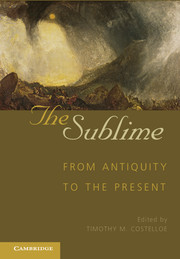Book contents
- Frontmatter
- Contents
- List of Illustrations
- Contributors
- Acknowledgments
- The Sublime
- Part One Philosophical History of the Sublime
- 1 Longinus and the Ancient Sublime
- 2 … And the Beautiful?
- 3 The Moral Source of the Kantian Sublime
- 4 Imagination and Internal Sense
- 5 The Associative Sublime
- 6 The “Prehistory” of the Sublime in Early Modern France
- 7 The German Sublime After Kant
- 8 The Postmodern Sublime
- Part Two Disciplinary and other Perspectives
- 10 The First American Sublime
- 11 The Environmental Sublime
- 12 Religion and the Sublime
- 13 The British Romantic Sublime
- 14 The Sublime and the Fine Arts
- 15 Architecture and the Sublime
- Bibliography
- Index
- References
3 - The Moral Source of the Kantian Sublime
Published online by Cambridge University Press: 05 January 2015
- Frontmatter
- Contents
- List of Illustrations
- Contributors
- Acknowledgments
- The Sublime
- Part One Philosophical History of the Sublime
- 1 Longinus and the Ancient Sublime
- 2 … And the Beautiful?
- 3 The Moral Source of the Kantian Sublime
- 4 Imagination and Internal Sense
- 5 The Associative Sublime
- 6 The “Prehistory” of the Sublime in Early Modern France
- 7 The German Sublime After Kant
- 8 The Postmodern Sublime
- Part Two Disciplinary and other Perspectives
- 10 The First American Sublime
- 11 The Environmental Sublime
- 12 Religion and the Sublime
- 13 The British Romantic Sublime
- 14 The Sublime and the Fine Arts
- 15 Architecture and the Sublime
- Bibliography
- Index
- References
Summary
We see other worlds in the distance, but gravity forces us to remain on the earth; we can see other perfections in the spirits above us, but our nature forces us to remain human beings.
INTRODUCTION
A distinctive feature of Kant’s account of the sublime is that the term “sublime” does not properly apply to any object in nature: no craggy peak, turbulent sea, or thunderous sky is sublime sensu stricto. Rather, “true sublimity must be sought only in the mind of one who judges, not in the object in nature.” Indeed, no sensible object – be it St. Peter’s or the Matterhorn – is truly sublime. Such a thing may be dubbed “sublime” only by courtesy, just inasmuch as it “awakens a feeling of a supersensible faculty in us” (CJ 5:250). Only a state of mind can truly be sublime (CJ 5:245–6, 257, and 264). Any account of the Kantian sublime must examine and account for this state of mind. Kant likens the sublime state of mind to a “vibration, i.e., to a rapidly alternating repulsion from, and attraction to, one and the same object” (CJ 5:258; see also CJ 5:245). But this clue about the phenomenology of the sublime does not adequately specify this state of mind, because other states of mind, such as weakness of will, might be described in similar terms.
In order to specify the sublime state of mind appropriately, we need to appreciate the significance of the sublime in the broader scope of Kant’s critical project. The received view – which Kant analyzes and corrects rather than dismisses outright – was that the sublime refers to something great or mighty in nature or art that arouses a distinctive pleasure in the subject. The pleasure is distinctive because it is mixed with a measure of pain or fear. In the Critique of the Power of Judgment, Kant explicitly acknowledges Edmund Burke’s A Philosophical Enquiry into the Origin of Our Ideas of the Sublime and Beautiful. Burke traces our enjoyment of the sublime in nature to the “passions” related to self-preservation. Whatever can “excite the ideas of pain, and danger,” he maintains, “… whatever is in any sort terrible, … or operates in a manner analogous to terror, is a source of the sublime.”
- Type
- Chapter
- Information
- The SublimeFrom Antiquity to the Present, pp. 37 - 49Publisher: Cambridge University PressPrint publication year: 2012
References
- 8
- Cited by



